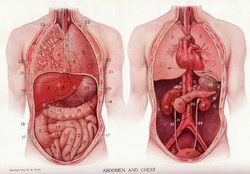
Symptoms of IBS often include:
• Abdominal pain
• Altered bowel function, constipation, and/or diarrhea
• Hypersecretion of colonic mucus
• Dyspeptic symptoms (flatulence, nausea, anorexia)
• Anxiety or depression
• Heartburn
The digestive tract is quite complex and IBS can be linked to many different causes making it difficult to pinpoint to exact triggers of the symptoms. Also, each individual case of IBS differs greatly from the next so it is important to consider and test for each cause. Some of the most likely sources leading to IBS are stress, food sensitivities and imbalance of gut bacteria. Of utmost importance is a detailed health history which helps determine the best course of action with regards to treatment and further testing.
Lab tests that can be useful to determine the cause of IBS include:
· IgG Food Allergy Test
· Comprehensive Digestion and Stool Analysis
· Small Intestine Bacterial Overgrowth Breath Test
· Betaine HCl Challenge
· Adrenal Profile
· Genetic Test – MTHFR
· Nutritional Profile
Once the cause of IBS has been determined treatment typically involves lifestyle changes to diet and exercise, nutritional supplements and herbs used to remove any harmful bacteria or yeast in the gut and heal the lining of the large and small intestines.
Gastrointestinal disorders are commonplace in our practice and we have had great success with helping to alleviate the causes and symptoms of these disorder.

 RSS Feed
RSS Feed